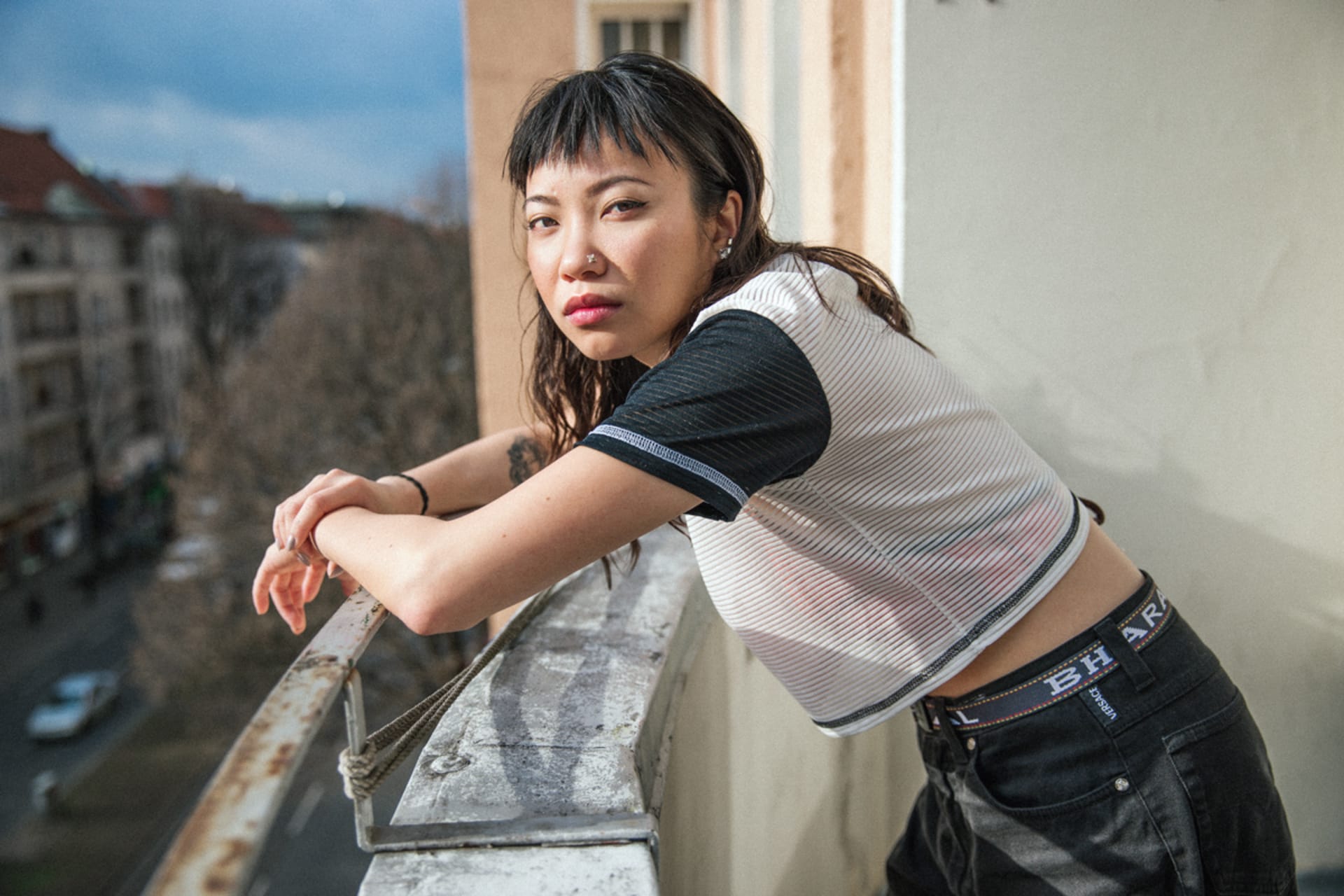
Dis Fig On Finding Her Voice In Industrial Noise And The Importance Of Isolation
Dis Fig's debut LP, 'PURGE', is out now via PTP.
New York native Felicia Chen (a.k.a. Dis Fig) cut her teeth as a DJ at OHM’s Trade parties. The trap-focused music events provided her with a platform upon which to showcase her unique take on playful R&B, ballroom, Jersey club and bass music. Her three-year tenure at the series has garnered her a large amount of popularity across Berlin’s alternative electronic music underground as well as further afield in North America and elsewhere in Europe.
2019 sees the artist’s first pursuits as a producer. But her debut full-length album, PURGE, is a radical departure from the sound that she’s become known for. The LP, which dropped on the New York label Purple Tape Pedigree on March 15, is a foray into deep, brooding and introspective industrial noise, replete with scorching vocal lines, beatless interludes and the sound of thrumming machines. Even the album artwork, which pictures Chen’s distorted screaming face, is a dramatic aesthetic step away from the more lighthearted fare that has come to define her DJ sets.
In light of her debut release and her surprising musical turn, TEB editor Chloé Lula decided to sit down with the DJ and producer to talk about the underlying motives that guided her artistic shift and the process of breaking free from the creative roles that musicians can so easily be restrained by.
The album release party will happen this Thursday, March 21 at the Berlin venue West Germany.
What was your involvement in the New York music scene before you relocated?
I didn’t really do much music until the end of my time in New York. When I first moved to New York, around 2010, was when I started getting into a lot of club music. The club climate was really abundant then. I went to a ton of bass nights, but I didn’t start DJing until just before I left, around 2014.
I moved to Berlin with the aim of writing music, but it took me a long time to. I tried to do it in New York as well, but I had three jobs at the time, and it wasn’t a place that was really nurturing me to make music, or even to learn. But when I came here, I fell into a nice community that really encouraged me to DJ and then to produce.
Do you feel like there was less of a bass and club music scene in Berlin compared to in New York?
There was a scene in Berlin, but it was really different. I definitely felt that there was something missing, some flavor that I had been used to in New York. But between when I moved here and now, it’s changed a lot. Techno has always been a constant, but this experimental club scene, where I guess my DJ sets have been dwelling, has evolved a lot.
You started your career here with the Trade parties at OHM. How long have you been involved with them?
I feel like I owe a bit to Simon who runs Trade, because he booked me for the first Trade party that he put on, in 2015. I don’t think anyone really knew about me then, and I hadn’t played many parties, so I guess he was taking a chance. I ended up playing really well, and he kept on booking me for the next ones.
Around that time, I also started my show Call Dibs with Hunni’d Jaws on Berlin Community Radio. I think that, plus my involvement with PTP in NYC, is what jumpstarted things for me.


What are your ties to PTP, the label that PURGE is coming out on? Were you part of the collective in New York?
Geng, who runs PTP, asked me to be a part of the collective around four years ago. He and I are like kin and PTP always feels more like a family than a collective. So when I was thinking about this album, I had no doubt in my mind that I wanted it to be with PTP.
PURGE is a fairly radical departure from the music you play when you DJ, which is much more playful. Even in your remixes on Danse Noire, you’ve gravitated towards hybrid club music. What instigated the shift?
I think that I never really intended on making club music in the first place. My DJ style has evolved throughout the years, but it doesn’t really fall in line with what I listen to at home, or what I’ve always wanted to produce.
Music was always a big part of my life, and especially when I was young, when I was a big choir nerd. I wanted to go to school for it as well, but growing up in a Chinese immigrant family doesn’t allow for going to an expensive school where you don’t end up with a specialization that’s financially stable…even though now I’m a DJ and a musician in Berlin! I’ve always missed using my voice and performing, and getting back to that place had always been the motive behind doing music as an adult. I just didn’t know how to at the time. I had given up on music for so long.
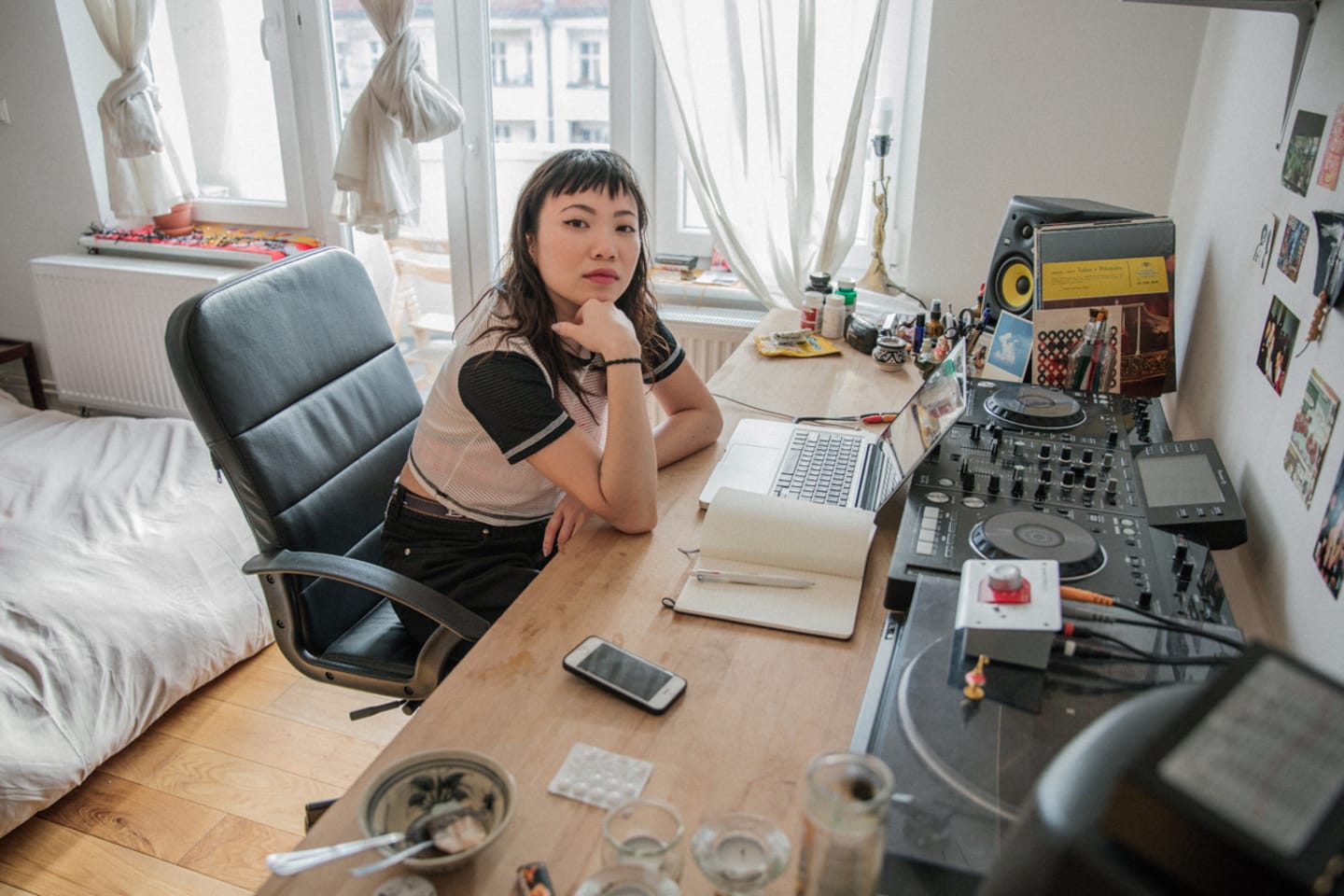
Is there any kind of cognitive dissonance that comes up for you in releasing and performing music that’s so different from what you’ve played historically? Do people have expectations that you’re going to put out music in a certain genre? It can be easy to be pigeonholed into a scene here.
I feel like I’ve been unwilfully struggling with this. I try not to, but it’s been something on my mind, especially because a lot of people have a hard time understanding that there can be a difference between what you play and what you make, or just expect that they have to be the same. And I feel like maybe my music is a lot darker, or a lot less fun, than what I might play. What I play is what I want to dance to on the dance floor at four in the morning, but that’s not the same as what I want to make, which is music I want to walk with or sit inside and have some kind of introspective experience with. Both are true extensions of myself, but they’re just for different times and spaces.
PURGE has a clear guiding concept—it’s really emotive and ostensibly comes from a desire to release yourself from some specific experience(s). Is there any particular life event that the tracks make reference to?
PURGE is really an emotional purge, and specifically my emotional purge, or your emotional purge. A lot of it stems from being away from home for a while and in Berlin in the bubble that I feel like I live in. A lot of the struggles that the album stems from are personal struggles that I’ve abandoned at home and political struggles that the United States is experiencing. I left right before the Ferguson riots and all that happened, when everything kind of burst into flames. It’s been difficult to deal with that here. You read about all of this shit, but you’re in your room, and maybe you cry about it for a bit, and you have a little moment to yourself, but the moment you open the door you’re surrounded by people who don’t have the same understanding and whom it doesn’t have the same impact on. So you forget about it and go on with your day.
I can only speak for myself, but I feel like I live in this world here where it’s been really easy for me to just shut everything off, even if I don’t want to. When I was writing the record, I had spent some time away from Berlin and in self-isolation, so I was able to really sit down and deal with everything.
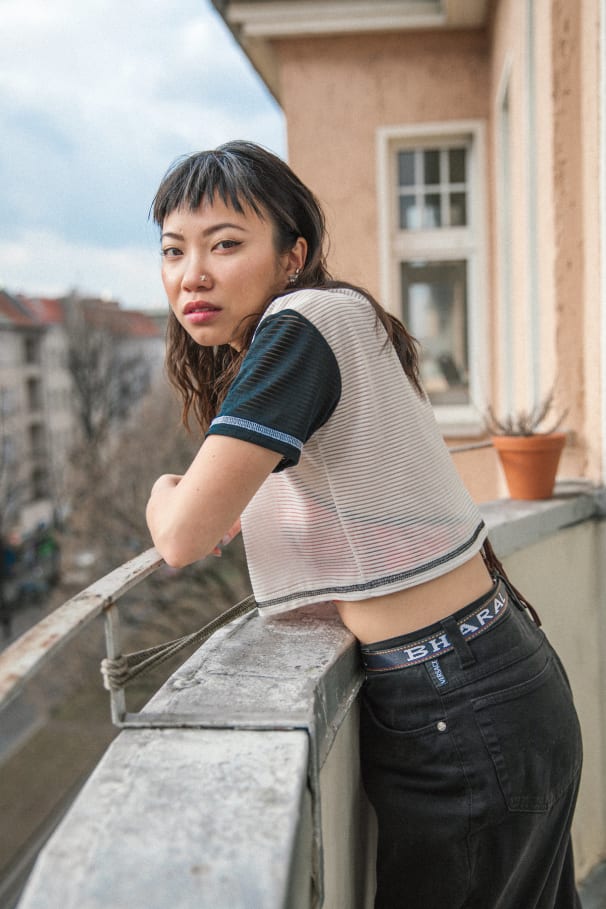
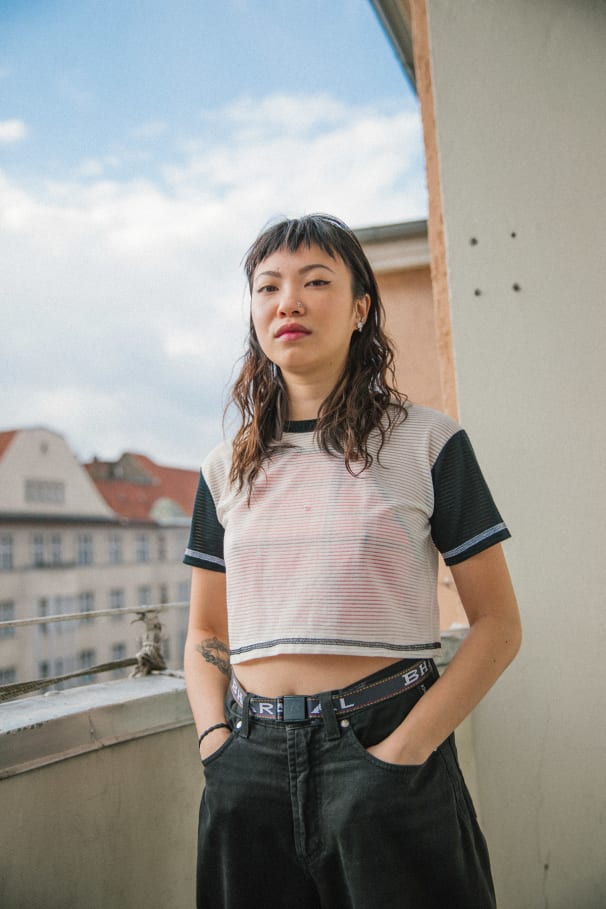
Where did you go?
I went to Crete for two months. I was there for Thanksgiving, Christmas and New Years all by myself. No friends. I actually avoided making friends. It was hard but also amazing to clear my head and spend some time with myself. I don’t think I would have been able to make this album without going there and doing that.
How exactly did you construct the album? Did you bring any instruments with you?
I brought a MIDI keyboard and a microphone that I didn’t use…I ended up just being lazy and using my Macbook to record everything. My intentions were to re-record shit, but when I left Greece, went back to New York and I tried to re-record things with a proper studio setup, it just didn’t sound the same. The Macbook microphone is so shitty, it starts picking up all of the different noises in your room, whether it’s the hum from the refrigerator or a car passing, and it sounds really nice. It gives it a nice warm character that I couldn’t replicate with a proper mic inside an insulated studio.
Do you think you’d have to isolate yourself again to write more music?
I feel like I would. I’ve been working on music in Berlin, but more remixes and collaborations. In terms of writing something that’s really true to myself and what I’m going through, something for an album, I would want to isolate myself again. I don’t think it would be the same as just going into the studio and saying, “Ok, it’s time to make a track now.” I think the reason why this one was so special and so important, and why you can feel so much from it, is because I was going through something at the time. It gives me a little anxiety because I’ll think, “Am I going to have to wait until I’m going through something in order to write again?” I don’t know. We’ll see.
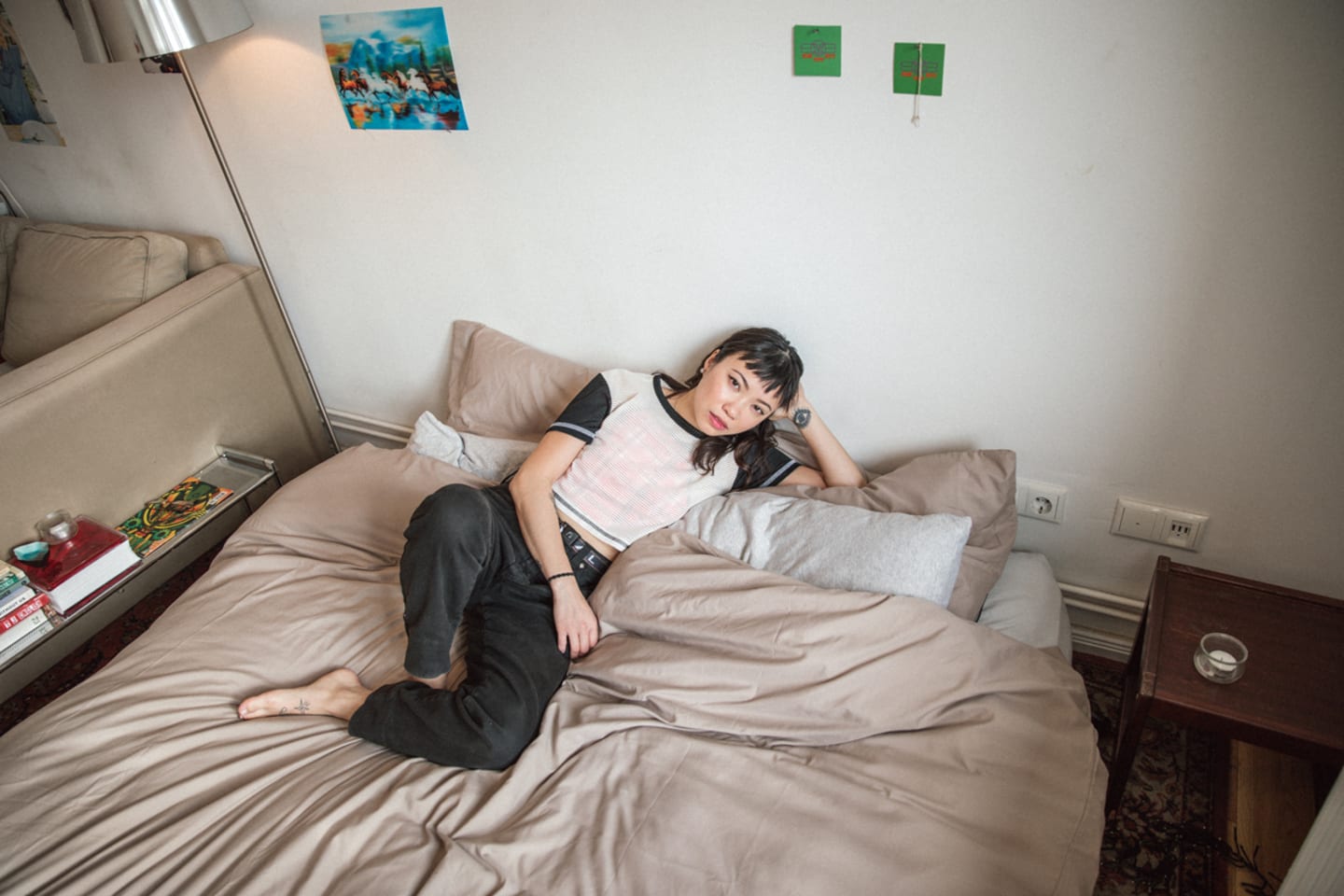
You recently made a Facebook post asking people if they know how to make their own instruments. Are you starting to experiment with that?
My goal is to make an instrument that I can play in my live sets. I really want to avoid this live set that is just “Watch me trigger shit that is already quantized”—not to throw any shade. But I would almost rather watch someone DJ to be honest, because it’s more improvisational than pressing things in order where we’ve already heard the tracks before. On top of vocals, I want to bring more live elements to it with live instrumentation and live improvisation.
I guess it stems from when I was younger and I was singing…I would always rock the improv parts because I could never remember the lyrics, so it was my chance to go off and do my own thing. I loved that, and I think that really connects with what I’m doing now.
Since I don’t know any instrument well enough to perform besides my voice, I thought it would be nice to make my own instrument. Something that’s not very hard to play, and that’s impossible to play perfectly because no one’s played it before. So it’s going to be a sort of noise box that has a contact mic in it and different things on top like springs or strings that you can bow or play somehow, and that can then be attached to a bunch of different pedals or plugins will make it a bit more atmospheric.
When and where is the release party?
The release party is on March 21 at West Germany in Berlin. I wanted it to be in a space that was far away from the club. The venue is perfect because it’s DIY, a bit rough and in-your-face. I wanted it to be in a place where you’re able to be confrontational—in a good way—and to be able to share a spiritual experience with a community in an intimate space. It will also be a benefit where all proceeds will be going towards a bond fund which helps detained immigrants in America get out of detention.
You can buy a copy of PURGE on PTP’s Bandcamp here. RSVP to the release party this Thursday, March 21 on the Facebook event.
Published March 18, 2019. Words by Chloé Lula, photos by Ava Burnes.
